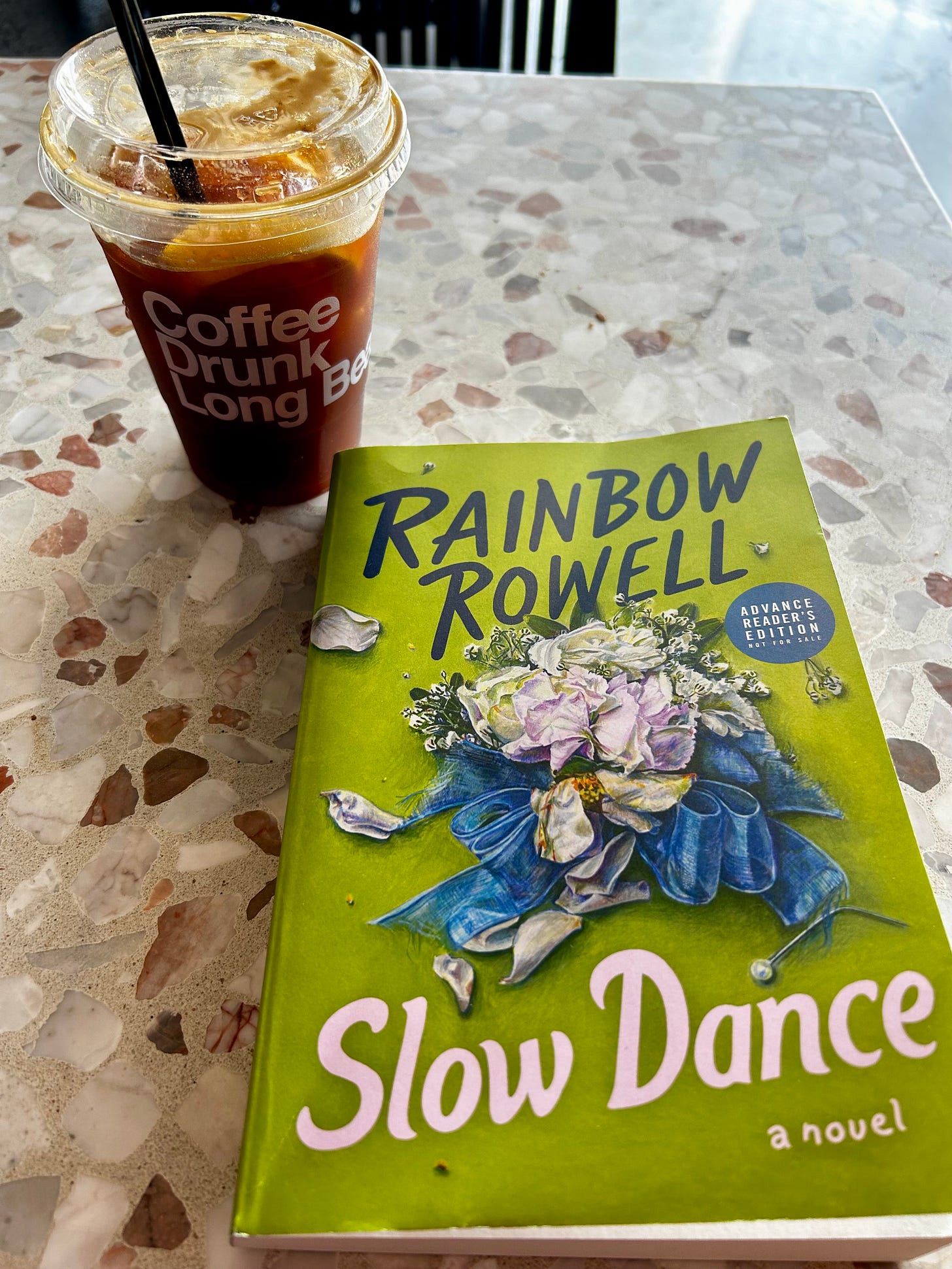I recently read (and loved) Rainbow Rowell’s “Slow Dance” and have thought about it almost daily since finishing it. I have been thinking of it partly because there are a few lines that have taken up residence in my brain, and partly because of what it made clear to me about the progression of work over time.
“Slow Dance” felt like the culmination of threads Rainbow has been pulling on in all her work, all woven expertly. If you look into her back catalog, you will start to see the concepts and themes she’s compelled by1 as they show up again and again. Rainbow published her first novel, “Attachments”, in 2011; “Slow Dance” is her eighth. That is many thousands of words to circle a set of ideas with (to say nothing of the short stories and the comic books, and the unpublished work that must exist). She couldn’t have written this as her first novel, both because her writing wasn’t there yet and because, I think, she didn’t know what she had to say in the same way that she does now. “Slow Dance” is excellent because it comes after so much other work and thought.
There is something magnetic to me about the idea of saying the same things in different ways, and using that repetition to hone and clarify what you mean.
The Bi Pod, the podcast I co-host, has seventy episodes now and we’ll put out another thirteen this year. I think we could easily make 100 more. When we started the podcast, we didn’t have grand ambitions2; we just wanted to talk about what we were thinking and feeling. We didn’t say this explicitly, but I think we also wanted to validate each other. I came out as queer in high school, but a decade later I still used to think, “am I… faking it? Is this only in my head?” Which was a real mind fuck! Having spent years feeling invisible and unreal, the podcast was a mechanism to make ourselves visible and tangible.
Three years in to making this show, I have spent many dozens of hours circling around the feelings and ideas of my own queerness. I have honed and clarified what it means to me to be queer (even as I am perpetually uncovering new facets). I couldn’t have gotten to that understanding in my own head. I needed to be in conversation about it and read about it and listen to other people talk about it, and to do all of those things repeatedly over time.
I have started writing a new novel, which in some ways is actually an old one. In November of 2020, I wrote 50K words of a project for NaNoWriMo and then realized it wasn’t one story but two. I’ve tried to approach it a few times since then, but hadn’t been able to hook in to it. I think I’ve finally cracked it—at least enough to be invested in moving it forward.
I’ve changed quite a few things from that 2020 version: I unbraided that second story3; I moved the characters four years into the future, making it an adult novel instead of YA; instead of being first person, present tense, it’s going to be third person, past tense. And maybe there’s going to be a second POV?4 They’re substantive changes, but in my mind it is still the same book I was trying to write four years ago; what I want to say and what I am trying to understand has stayed the same.
Making all these changes, and how good they feel, also has me thinking about “I’m with the Band”, the novel I let go of earlier this year. I am curious what this book will teach me about that one, and what ideas it might clarify for me. This book is very different from IWTB, but there are really only five or six ideas I am consistently obsessed by, so when you peel back the skin the guts are mostly the same. I wonder, also, what I will learn six books from now. What will become clear by building a back catalog, by saying the same thing in new ways over and over again?
I look forward to finding out.
obsessed by? I think obsessed.
despite my saying in the very first episode that I wanted to interview Casey McQuiston.
maybe one day it will be its own book, maybe not. It lost 75% of its main character in the split, which is a lot for an idea to lose.
I have not written anything in the second point of view yet, so, that remains to be seen. I keep thinking about it though, which is telling.







This is so good. And also the exact opposite reaction to what I tell myself about my body of work: why am I always talking about the same things. I’ll think about your viewpoint and mull it over when reviewing my current batch of essays waiting in the wings.
Congrats on the 70+ episodes! Wow!
I'm only toe-deep into mine--it’s been a n almost a month and got 6 episodes in.
What was a comfortable production schedule when you first started podcasting??? Does it still meet your needs?